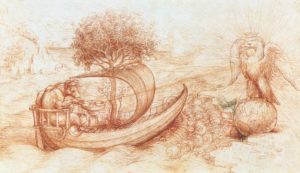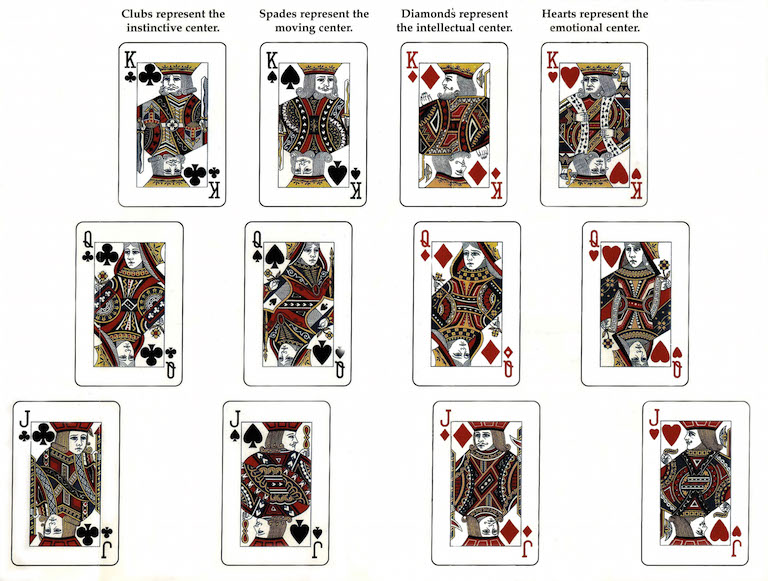Editors‘ note: In the Fourth Way today, understanding our lower centers and how they can work together in balance is key. This article describes the lower brains or centers in each person, and how balancing of these functions leads to experiencing higher states.

The Hoopoe – leading the way from lower centers to higher worlds, from The Conference of the Birds by Attar
The Seven Centers of the Human Machine
The Fourth Way describes the human machine as having four lower centers, or functions: an instinctive, moving, emotional, and intellectual center. The common deck of cards shows this in the suits of clubs, spades, hearts, and diamonds, respectively[1]. There is an additional sex center, together making five functions. On top of these there are two additional centers, higher emotional and higher mental. The latter are also called Presence, or Third Eye.
Subdivisions of the Lower Centers
Each of the four lower centers has three subdivisions, according to their level of attention. The bottom-most division functions without any attention, as the mechanical part, or jack. In the middle division, attention is held by an object, either external or internal. This subdivision is the emotional part, or queen. The upper division makes an effort to control and direct attention[2], and it is the intellectual part, or king.
Capabilities of the Lower Centers in Reaching Consciousness
The mechanical and emotional parts of centers are less conducive to higher states, whereas the intellectual parts of centers can promote and support higher centers. Specifically, the part in the machine that can recognize and promote presence is a division of the king of hearts. This nine of hearts can be represented as the tree of life. However, the instinctive center as a whole, and the king of clubs in particular, tend to oppose awakening.
Center of Gravity in the Lower Centers
Each of us is born with a predominant function, or center of gravity. For man number one, this is a moving/instinctive center of gravity. For man number two, it is an emotional center of gravity. A man number three has an intellectual center of gravity. But men number one, two, and three are equally mechanical. In man number one, perceptions of movement and bodily sensations outweigh others. For man number two, feelings have a tendency to drown the sounds of instinct and thought. Whereas in man number three, thoughts and ideas predominate.
Center of Gravity as a Result of Work
A man (or woman) number four is a result of school work. Such a person develops a ‘center of gravity’ in the work. Man number four balances centers as a requirement for the appearance of presence, or Third Eye. Balance comes through attending to the needs of all four centers, rather than chiefly one. Emotions, thoughts, movements, and sensations must balance, as a prerequisite for higher centers to appear and sustain themselves.
“We advance like a drunkard, moving in circles.” Sufi saying
Balancing the lower centers is not a linear process. One does not necessarily eat physical food, move the body, listen to emotional music, and read a book, one after the other. Ultimately, the relative needs of the lower centers are addressed according to the changing requirements of the moment.
A Leonardo Allegory on the Struggle within Man
The following image by Leonardo Da Vinci, an allegory with a wolf and an eagle, may shed some light on this subject.

Leonardo da Vinci – Allegory with Wolf and Eagle
Often, scholars say the wolf alludes to the pope and the eagle to the French king. This is a possible outer meaning. But could it have another meaning? The wolf may represent the king of clubs, with the boat as the nine of hearts. While the eagle may represent the intellectual parts of centers, capable of controlling the passions, i.e., the instinctive and emotional parts.
“Only he will deserve the name of man and can count upon anything prepared for him from Above, who has already acquired corresponding data for being able to preserve intact both the wolf and the sheep confided to his care.” George Gurdjieff
[1] Robert Earl Burton. Website: http://livingpresence.com
[2] Girard Haven.
